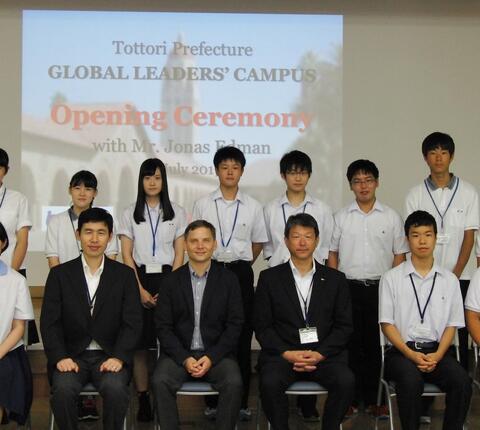SPICE Local Student Programs in Japan

Local Student Programs in Japan
SPICE offers courses in nine regions, four universities, and six high schools in Japan. Most are online.
Regions
Fukuoka Prefecture
Stanford e-Fukuoka explores U.S.–Japan relations, UN Sustainable Development Goals, and entrepreneurship. High school students engage in discussions with speakers on topics such as Japanese immigration to the United States, the historical preservation of cultural sites, and media representations of ethnicity.
Hiroshima Prefecture
Stanford e-Hiroshima emphasizes the deep interdependence between Japan and the United States. High school students study topics such as early Japanese immigration to the United States, entrepreneurship, and the Hiroshima-Honolulu sister city relationship.
Oita Prefecture
Stanford e-Oita introduces high school students to U.S.–Japan relations, UN Sustainable Development Goals, and entrepreneurship from local and global perspectives. Topics include Japanese immigration to the U.S., education in the U.S. and Japan, and environmental issues and technology.
Tottori Prefecture
Stanford e-Tottori focuses on the importance of diversity and cross-cultural communication in the context of U.S.–Japan relations. High school students learn about topics such as the U.S. educational system, Silicon Valley, mental health, nature conservation, and diversity.
Wakayama Prefecture
In Stanford e-Wakayama, scholars introduce high school students to various academic fields through a global lens. The fields include computer science, anthropology, linguistics, communications, global studies, physics, political science, sociology, and music.
Yamaguchi Prefecture
Stanford e-Yamaguchi introduces high school students to the topics of sustainability and leadership. Students examine how technology and social outreach can help people co-exist on Earth over a long period of time and consider what it means to be a global citizen.
Kagoshima City
Stanford e-Kagoshima City provides high school students the opportunity to discuss topics centered around diversity, revitalization, and entrepreneurship. Students engage in activities that explore diversity in the United States, women-led entrepreneurship, and revitalization through start-up businesses.
Kawasaki City
Stanford e-Kawasaki teaches high school students to think critically about diversity and entrepreneurship in the United States and Japan. Some course topics include diversity in the United States and Japan, the Silicon Valley ecosystem and mindset, and entrepreneurship and its challenges in Japan.
Kobe City
Stanford e-Kobe challenges high school students to critically examine the role of diversity and entrepreneurship in the United States and Japan. Specific topics include equity, LGBTQ+ issues, multiculturalism, Silicon Valley, and the Seattle-Kobe sister city relationship.
Universities
Eikei University of Hiroshima
In the Social Entrepreneurship course, students at the Eikei University of Hiroshima explore the intersection of entrepreneurship, social innovation, and sustainability through a human-centered approach. A dynamic blend of guest lectures, interactive sessions, and hands-on workshops is designed to equip students with the skills and mindset needed to drive impactful social change.
Kyushu Sangyo University
The Stanford e-KyuSan-U Program helps to cultivate an entrepreneurial mindset in students at Kyushu Sangyo University in Fukuoka. The program challenges students to think critically and creatively from both global and local perspectives. The main topics include diversity, sustainability, and entrepreneurship.
Prefectural University of Hiroshima
The Stanford-Hiroshima Collaborative Program on Entrepreneurship helps to nurture entrepreneurial thinking in MBA students enrolled at the Hiroshima Business and Management School of the Prefectural University of Hiroshima. The students are exposed to real-life case studies to analyze Silicon Valley’s ecosystem and think critically about entrepreneurial competence and qualification.
Waseda University
The SPICE/Stanford-Waseda Intensive Course is organized in collaboration with the Faculty of Social Sciences at Waseda University. The course offers undergraduate and graduate students at Waseda University an opportunity to explore global issues—such as social entrepreneurship; diversity; and the role of cultural understanding, education, and international relations in fostering peace—through an interdisciplinary lens.
High Schools
FC Imabari High School
Stanford e-FC Imabari invites students at FC Imabari High School and surrounding public schools to consider their roles in the local community and the world at large. The program focuses on diversity, entrepreneurship, and community building.
Minamata High School
Stanford e-Minamata introduces the environment, entrepreneurship, and U.S.–Japan relations to students at Minamata High School in Minamata City. Topics of study include environmental justice, the SDGs, diversity, and emerging technologies.
Seibu Bunri High School
Stanford e-Bunri provides Seibu Bunri High School students the opportunity to discuss social issues, broaden their understanding of diverse perspectives, and cultivate critical and innovative thinking skills that promote social change. Topics of study include diversity, women's rights, and entrepreneurship.
Sendai Ikuei High School
Stanford e-Sendai Ikuei offers Sendai Ikuei High School students the opportunity to hone their English and critical thinking skills through the examination of international issues. Topics of study include diversity, global citizenship, and entrepreneurship.
Takatsuki Senior High School
Stanford e-Takatsuki provides high school students at Takatsuki Senior High School in Takatsuki City a broad overview of the importance of global health. Some of the course topics are stem cell research, health care in developing countries, the medical device industry, and psychiatric care.
Yokohama Eiri Girls’ High School
Stanford e-Eiri introduces the United Nations Sustainable Development Goals to students at Yokohama Eiri Girls’ High School in Yokohama City. Some of the topics are gender, peace, environment, inequality, and sustainability, with a special focus on the role of girls and women.
Learn More
Read the latest updates about these programs, learn about our other student programs, or subscribe to our email list.
